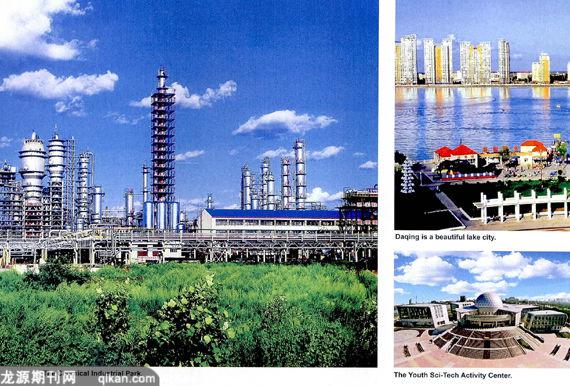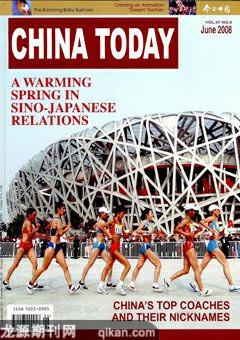Daqing Revitalized
XU YING
DAQING, a city in Chinas northeast, has a proud record. Its oil industry was founded 49 years ago, and at its peak produced more than 50 million tons of crude oil annually for 27 years running, a world-class achievement. Daqing also has unparalleled human capital, and it is that potential which has propelled the city into the 21st century.
Han Xuejian, secretary of the CPC Daqing municipal committee, is emotional when discussing the citys development. He has been here for four years, and before assuming his current post in February 2008, was the citys deputy mayor, acting mayor and later full mayor. “We have more than just oil,” he said proudly. “The resources we have include numerous freshwater lakes and hot springs unmatched by any other place.”After years working here, he loves the city and knows it like the back of his hand.
“As a resource-based city, the biggest challenge the people of Daqing face, and one they share with others, is how to sustain development,” Han Xuejian continued. “We have identified the challenge,” Han said confidently.To him, the past 49 years of development have made the city much more resilient. Everyone knows, he said, that Daqing has large crude oil and natural gas deposits. And on top of that, Da-qing is a breadbasket. Its milk cow and cattle production lead other regions in Heilongjiang Province. It also has 2 million acres of pastureland, ranking first in the province.
But Daqings most important asset, Han Xuejian argues, is its human potential. “Daqing has abundant scientific-technical and managerial personnel. Daqing was the first city in the Peoples Republic to embrace modern industry. Its sci-tech personnel, in the oil and chemical industries in particular, lead the country. They form the backbone of the citys transformation from a purely resource-based economy,”he said.

“That transformation will not been easy,” Han Xuejian continued. “While making a significant contribution to the country, Daqing has been left with several unresolved problems, mainly a structural imbalance between the oil industry and non-oil industries. Righting that imbalance has been bottlenecked by the system, and by the clash between old and new concepts. These problems have hampered further development, and have to be rectified. Serious problems should not be evaded. We have inadequate back-up resources, an imbalanced tapping of our oil deposits, distorted industrial structures, weak industries other than oil and petrochemicals, less than satisfactory management and ecological deterioration.”
To Han Xuejian, the first task for Daqings transformation from a resource-based economy is to replace its energy-consuming development model with a cyclic economic structure. “In the last few years,” Han Xuejian continued, “Daqing has shifted its focus onto a sustainable development model, and a reconstruction of our economic, ecological, urban and human resource structure by improving traditional industries. As one of the countrys oil production bases, Daqing will continue to make great contributions in this field. We must strengthen continuous industries, such as deep processing of agricultural and animal husbandry products, equipment making for oil and petrochemical production, and the outsourcing of services. We must restore the ecology by marshalling the efforts of all sides, from national, provincial and local governments, to industry, society and business enterprises. And we need to improve our two major water systems in Dongcheng and Xicheng districts, and plant trees and flowers to make Daqing more beautiful. Lastly, we must advance transportation infrastructure projects like the airport, West Railway Station and the highway passenger transportation hub. Together with cultural, sports, medical and health care projects, we will make the city a pleasant place to live.”
Han Xuejian was confident those objectives would be realized. “By 2010, annual GDP growth willreach 8 percent, and the ratio between the oil and non-oil sectors will shift from the current 61:39 to 50:50. Political stability and steady economic growth will guarantee that those objectives are accomplished.”
“From an oil deposit to a city,” was how Han Xuejian proudly described Daqings history. “The people of Da- qing spent 40 years getting here. But the clock is ticking for an urgent transformation from a resource-based economy to that of a modern metropolis. We have no time to lose, and have to run at top speed!”
Biography:
Han Xuejian, born in November 1961, native of Lanxi County, Heilongjiang Province, graduate of the Heilongjiang Provincial Party School, majored in economic management. Joined the CPC in December 1985, and served successively as deputy director of the Heilongjiang Provincial Trade Department, chief of the Provincial Trade Bureau,deputy mayor of Qiqihar,deputy secretary of the CPC Qiqihar municipal committee,deputy secretary of the CPC Daqing municipal committee, deputy mayor, acting mayor and full mayor of Daqing. Currently secretary of the CPC Daqing municipal committee.

